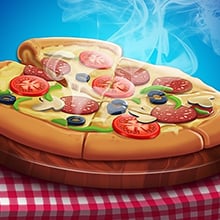
Pizza Games
Discover 13 amazing pizza games. Play for free and have fun!
About Pizza Games
What Are Pizza Games?
Pizza games are a sub-genre of simulation and time-management video games centered around the theme of pizza creation and restaurant management. These games can range from casual mobile applications to more complex PC or console titles, offering a variety of gameplay experiences. In these games, players typically assume the role of a pizza chef or restaurant owner, where they are responsible for various tasks such as taking orders, preparing ingredients, cooking pizzas, and serving customers. The primary objective is often to satisfy customer demands while managing time and resources effectively.
Are Pizza Games the Same as Real Life?
While pizza games draw inspiration from the real-life experience of running a pizza restaurant, they do not fully replicate the complexities involved in actual pizza-making and restaurant management.
Simplification of Processes: In real life, creating pizza involves a series of steps that require skill and precision, such as making dough, selecting fresh ingredients, and managing cooking times. Pizza games often streamline these processes, allowing players to drag and drop ingredients to create pizzas, which simplifies the experience for faster gameplay.
Time Constraints and Customer Expectations: In reality, managing a pizza restaurant involves meeting customer expectations, handling complaints, and maintaining quality control, all of which can be quite challenging. Pizza games often exaggerate these aspects for comedic effect, placing players under time constraints that lead to frantic, fun gameplay rather than realistic scenarios.
Creative Freedom: Unlike real-life pizza-making, where specific recipes and ingredient combinations matter, pizza games often encourage players to experiment with unusual toppings and combinations. This creative freedom adds an entertaining layer to the gameplay but diverges from the actual culinary process.
Game Mechanics vs. Real Skills: While players can learn about ingredient combinations and basic restaurant management through these games, they don’t replace the real skills required for culinary arts or business management.
How to Play Pizza Games?
Learn the Mechanics: Once you select a game, take some time to understand its mechanics. Many pizza games start with a tutorial that guides you through the basics, including how to take orders, prepare ingredients, and serve customers efficiently. Familiarizing yourself with the game’s interface and controls is crucial for success.
Time Management: In most pizza games, managing time effectively is critical. Players often face multiple orders at once, requiring them to prioritize tasks to keep customers satisfied. As the game progresses, the pace may quicken, increasing the challenge. Developing a strategy for managing multiple orders can lead to higher scores and better customer satisfaction.
Experiment with Recipes: One of the fun aspects of pizza games is the ability to create custom pizzas. Players can mix and match different toppings, sauces, and cheeses to craft unique pizzas. Experimenting with recipes can lead to discovering secret combinations that earn bonus points or unlock new game features.
Engage with Challenges: Many pizza games feature a variety of challenges or missions that players can complete for rewards. These challenges often require players to accomplish specific tasks within a time limit or achieve a certain level of customer satisfaction. Engaging with these challenges can keep the gameplay fresh and exciting.
Best Advantages of Pizza Games
Fun and Engaging Gameplay: Pizza games are designed to be entertaining, often featuring colorful graphics, catchy sound effects, and humorous situations that enhance the gaming experience. The light-hearted nature of these games makes them accessible to players of all ages.
Creativity and Customization: These games allow players to unleash their creativity by designing unique pizzas with various toppings and ingredients. The ability to customize recipes and presentation encourages imaginative gameplay and experimentation.
Development of Time Management Skills: Pizza games promote quick thinking and efficient multitasking. Players must prioritize tasks, manage multiple orders, and keep customers happy, which can enhance time management skills applicable in real-life situations.
Stress Relief and Relaxation: Engaging in pizza games can serve as a stress reliever, providing an escape from daily routines. The light-hearted challenges and fun graphics can create a relaxing environment where players can unwind.













